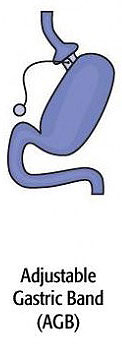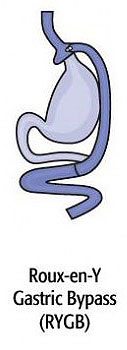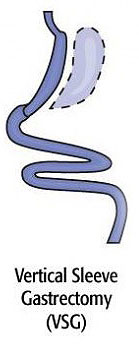Bariatric Surgery
Obesity is one of the fastest growing health problems in the United States today. Obese people are at higher risk for diabetes, hypertension (high blood pressure), high cholesterol, gallstones, bone and joint problems, heart disease and heart attacks, stroke, cancer, liver problems, asthma and other breathing problems, and sleep apnea.
 Obesity is a medical condition that is diagnosed by a physician. Generally, obesity is determined using the Body Mass Index (BMI), but weight size and other factors may be involved as well.
Obesity is a medical condition that is diagnosed by a physician. Generally, obesity is determined using the Body Mass Index (BMI), but weight size and other factors may be involved as well.
Many patients have struggled for years to achieve significant, lasting weight loss. Surgical weight loss, called bariatric surgery, as part of a commitment to life-long lifestyle changes, is one of the most effective long-term treatments available for obesity. It is usually covered by insurance plans.
No matter where you are in your weight loss journey, the caring and skilled bariatric team at Long Island Surgery can help you reach your health and wellness goals. We perform 3 types of bariatric surgery, the Laparoscopic Adjustable Gastric Band (“Lap Band”), the Roux en Y Gastric Bypass, and Sleeve Gastrectomy. If you are a candidate for bariatric surgery, there are many different factors that will determine which option is right for you. Through consultation and pre-surgical medical evaluation, we will work with you and your primary care physician to determine the best option to achieve your health and wellness goals.
Procedures
Laparoscopic Adjustable Gastric Band
 The Laparoscopic Adjustable Gastric Band procedure, also called the LAP-BAND® or REALIZE® Band, is a restrictive procedure designed to reduce total caloric intake.
The Laparoscopic Adjustable Gastric Band procedure, also called the LAP-BAND® or REALIZE® Band, is a restrictive procedure designed to reduce total caloric intake.
This procedure uses an adjustable band to create a small pouch in the upper part of the stomach. It is similar in theory to the Vertical Banded Gastroplasty or “stomach stapling”, however it is adjustable, less invasive, and carries less risk and recovery time. It does not involve any cutting of the stomach.
The small pouch created by the lap band helps the patient feel full quickly and prolongs the feeling of fullness. The band contains an adjustable balloon inside that connects to a small port placed under the skin. A physician can adjust the band at any time during an office appointment by injecting sterile saline (sterile water) into the port. An adjustment is painless and takes approximately 15-20 minutes. Having regular adjustments to the band is extremely important for the long-term success of the procedure.
As with all bariatric procedures, nutritional counseling and life style changes are essential to prevent malnutrition due to the decreased caloric intake as well as to ensure overall success of the procedure.
Roux en Y Gastric Bypass
 The Roux en Y Gastric Bypass procedure, commonly called Gastric Bypass, is both a restrictive and malabsorptive procedure. It involves both a reduction in stomach size and bypassing a part of the small intestine (the duodenum). The small intestine is the portion of the GI tract where most of the nutrients are absorbed into the body.
The Roux en Y Gastric Bypass procedure, commonly called Gastric Bypass, is both a restrictive and malabsorptive procedure. It involves both a reduction in stomach size and bypassing a part of the small intestine (the duodenum). The small intestine is the portion of the GI tract where most of the nutrients are absorbed into the body.
During a gastric bypass procedure, your surgeon will create a pouch using a small part of the stomach and connect the middle part of the small intestine (the jejunum). The remainder of the stomach and the small intestine are left inside the body. The pouch helps the patient feel full quickly and helps prolong the feeling of fullness. The food then enters the small intestine where it is minimally absorbed. The combination of calorie restriction and reduced nutrient absorption generally creates a more rapid weight loss than other bariatric procedures.
As with all bariatric procedures, nutritional counseling and life style changes are essential to prevent malnutrition due to the decreased caloric intake and decreased nutrient absorption, as well as to ensure overall success of the procedure. Consuming sugary foods and drinks after this procedure may cause dumping syndrome, also called rapid gastric emptying. Undigested food moves too quickly into the small intestine, causing lightheadedness, diarrhea, cold sweats, and mild heart palpitations.
Sleeve Gastrectomy
 Sleeve gastrectomy is a restrictive procedure, designed to reduce caloric intake. It involves removing approximately 60 percent of the stomach, leaving a sleeve or tube-like portion remaining. This procedure is generally performed as a first procedure for level 3 obesity sufferers or high-risk patients in preparation for a gastric bypass or duodenal switch. Using the combined procedure approach has significantly reduced risks of weight loss surgery for certain groups of patients.
Sleeve gastrectomy is a restrictive procedure, designed to reduce caloric intake. It involves removing approximately 60 percent of the stomach, leaving a sleeve or tube-like portion remaining. This procedure is generally performed as a first procedure for level 3 obesity sufferers or high-risk patients in preparation for a gastric bypass or duodenal switch. Using the combined procedure approach has significantly reduced risks of weight loss surgery for certain groups of patients.
